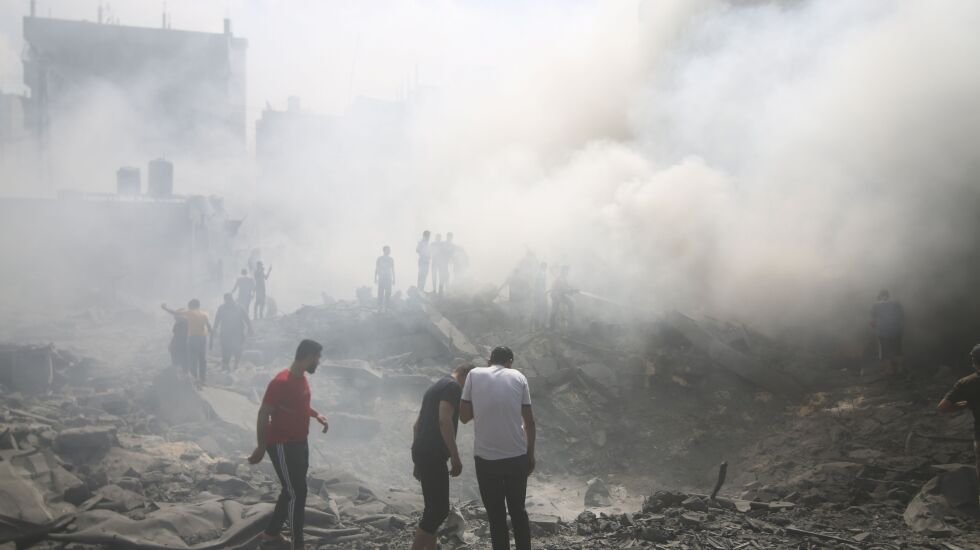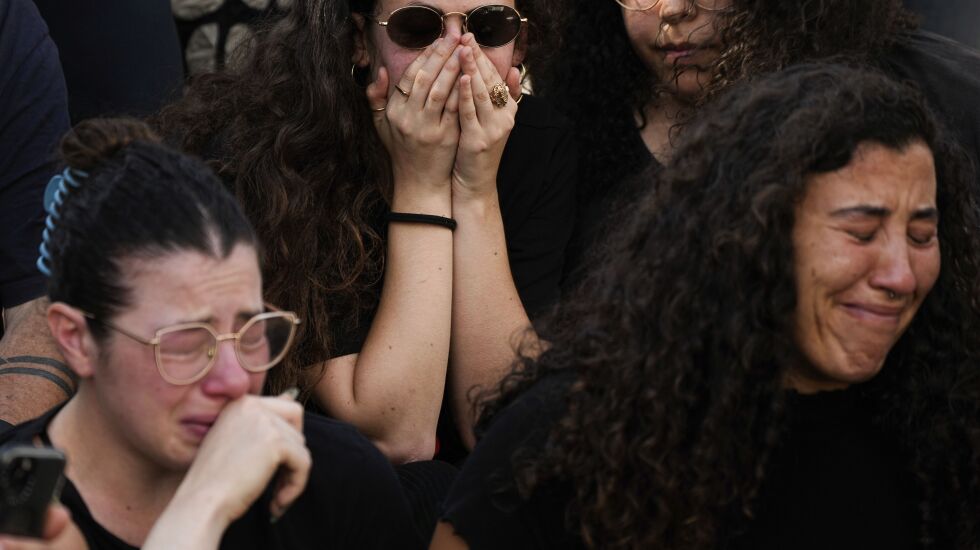
JERUSALEM — U.S. Secretary of State Antony Blinken vowed American support to Israel on Thursday as its military pulverized the Hamas-ruled Gaza Strip with airstrikes and prepared for a possible ground invasion. As Palestinians tried to stock up on bread and groceries amid dwindling supplies, Israel said nothing would be allowed into Gaza until Hamas militants freed some 150 hostages taken during their deadly weekend incursion.
International aid groups warned of a worsening humanitarian crisis after Israel halted deliveries of food, water, fuel and electricity to Gaza’s 2.3 million people and prevented entry of supplies from Egypt. The war has claimed at least 2,700 lives on both sides.
“Not a single electricity switch will be flipped on, not a single faucet will be turned on, and not a single fuel truck will enter until the Israeli hostages are returned home,” Israeli Energy Minister Israel Katz said on social media.
Lt. Col. Richard Hecht, an Israeli military spokesman, told reporters Thursday that forces “are preparing for a ground maneuver” should political leaders order one. A ground offensive in Gaza, where the population is densely packed into a sliver of land only 25 miles long, would likely bring even higher casualties on both sides in brutal house-to-house fighting.
As Israel pounds Gaza from the air, Hamas militants have fired thousands of rockets into Israel. Amid concerns that the fighting could spread in the region, Syrian state media reported that Israeli airstrikes on Thursday hit international airports in the Syrian capital, Damascus, and in the northern city of Aleppo, putting them out of service.
Palestinians fleeing airstrikes in Gaza could be seen running through the streets, carrying their belongings and looking for a safe place. The number of people who fled their homes reached 340,000 people by Wednesday night — roughly 15% of Gaza’s population. Most crowded into U.N.-run schools while others are staying with relatives or even strangers.
In long lines at bakeries and groceries that dared open, people tried to stock up before shelves emptied. On Wednesday, Gaza’s only power station ran out of fuel and shut down, leaving only lights powered by scattered private generators.

Hospitals, overwhelmed by a constant stream of wounded and running out of supplies, have only a few days worth of fuel before their power cuts off, aid officials say. The cut-off has also caused dire water shortages for over 650,000 people, according to the U.N.
“Without electricity, hospitals risk turning into morgues,” said Fabrizio Carboni, regional director of the International Committee of the Red Cross. Newborn incubators, kidney dialysis machines, X-rays, and more, are all dependent on power, he said.
Ambulance crews carrying bodies from the rubble of demolished buildings to the morgue at Gaza’s biggest hospital, Shifa, found no space left. Dozens of bodies in body bags were lined up in the hospital parking lot. Fourteen health facilities have been damaged in strikes, health officials said Thursday.
“The situation is very critical,” said Shifa hospital director Mohammad Abu Selmia. “We’ve never seen days in Gaza like what we see now.”
With Israel sealing off the territory, the only way in or out is through the crossing with Egypt at Rafah. Egypt’s Foreign Ministry said it has not officially closed Rafah but airstrikes have prevented it from operating. Egypt has been trying to convince Israel and the United States to allow the delivery of aid and fuel through Rafah.
Israeli Prime Minister Benjamin Netanyahu vowed to “crush” Hamas after the militants stormed into the country’s south on Saturday and massacred hundreds of people, including killings of children in their homes and young people at a music festival. Netanyahu alleged Hamas atrocities, including beheading soldiers and raping women. His allegations could not be independently confirmed.
Amid grief and demands for vengeance among the Israeli public, the government is under intense pressure to topple Hamas rather than continuing to try to bottle it up in Gaza.

Four previous conflicts ended with the group still firmly in control of the territory it has ruled since 2007. Israel has mobilized 360,000 reservists, massed additional forces near Gaza and evacuated tens of thousands of residents from nearby communities. A new war Cabinet, which includes a longtime opposition politician, is now directing the fight.
A high-ranking Hamas official, Saleh Al-Arouri, warned on Thursday that any Israeli invasion of Gaza “will turn into a disaster for its army,” saying the group was prepared to respond.
Blinken’s visit underscored American backing for Israel’s retaliation.
“You may be strong enough on your own to defend yourselves, but as long as America exists you will never have to,” Blinken said after meeting with Netanyahu in Tel Aviv. “We will always be there by your side.”
Blinken is to meet Friday with Palestinian President Mahmoud Abbas, whose authority is confined to parts of the occupied West Bank, and Jordan’s King Abdullah II.
Israel captured the West Bank, along with Gaza and east Jerusalem, in a 1967 war. The Palestinians want all three territories for their future state, but there have been no peace talks in over a decade.
In Gaza, the Israeli military said overnight strikes targeted Hamas’ elite Nukhba forces, including command centers used by the fighters in Saturday’s attack, and the home of a senior Hamas naval operative that it said was used to store unspecified weapons. Other airstrikes killed commanders from two smaller militant groups, according to media linked to those organizations.
“Right now we are focused on taking out their senior leadership,” Hecht, the military spokesman, said of Hamas. “Not only the military leadership, but also the governmental leadership, all the way up to (top Hamas leader Yehia) Sinwar.”

Israel is employing a new tactic of leveling whole neighborhoods, rather than just individual buildings. Hecht said targeting decisions were based on intelligence and civilians were warned.
Even with the warnings, Palestinians say some are unable to escape or have nowhere to go, and that entire families have been crushed under rubble.
Drone footage filmed by The Associated Press revealed extensive damage at the Shati refugee camp, in the north of Gaza, following overnight airstrikes. Residents used their bare hands to clear rubble, searching for survivors. A man who was informed his missing family members were dead collapsed in the arms of a fellow resident.
Jaber Weshah, a 73-year-old rights activist, said there was no warning when a strike leveled a multi-story building neighboring his in the Bureij refugee camp early Wednesday. At least 12 people were killed, including a bookseller, his wife and two toddler daughters and six members of another family, residents said.
“It was an inferno,” Weshah said.
The Palestinian Health Ministry said two Palestinians were killed in the West Bank on Thursday when Israeli settlers sprayed bullets at a funeral for three people killed in a settler rampage the day before. Footage showed Jewish settlers in their cars swerving into the funeral procession and cutting off the road before stopping and opening fire.
The Health Ministry says more than two dozen Palestinians have been killed in the West Bank and two in Israeli-annexed east Jerusalem since Saturday, most when police fired on stone-throwing protesters.
The death toll in Gaza rose to more than 1,400 killed, the Palestinian health ministry said.
The Israeli military said more than 1,300 people, including 247 soldiers, have been killed in Israel, a staggering toll unseen since the 1973 war with Egypt and Syria that lasted weeks.
Thousands have been wounded on both sides.
Israel says roughly 1,500 Hamas militants were killed inside Israel, and that hundreds of the dead inside Gaza are Hamas members.
Shurafa reported from Gaza City, Gaza Strip. Associated Press writers Amy Teibel and Isabel DeBre in Jerusalem; Sam McNeil in Be’eri, Israel; Jack Jeffrey and Samy Magdy in Cairo; and Kareem Chehayeb in Beirut contributed to this report.



.png?w=600)



